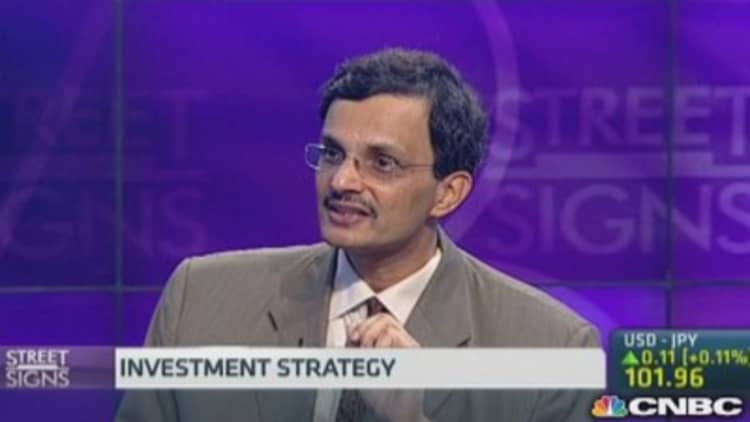China's president says the economy must adapt a "new normal" in the pace of growth. And that means Beijing is unlikely to step in with broad stimulus measures, analysts say.
The world's second largest economy is still in a "significant period of opportunity," but must take "timely countermeasures to reduce potential negative effects," Xi Jinping was quoted saying by the Xinhua news agency at the weekend.
Read MoreChina's huge currency reserves now a headache: Premier
"What is interesting about the 'new normal' is this line on forward guidance: 'the government must prevent risks and take timely countermeasures to reduce potential negative effects (on the economy),'" Evan Lucas, a market strategist at IG in Melbourne said in a note Monday.
"This is the clearest sign I have seen that a broad-based monetary stimulus to alleviate that current slowdown will not eventuate," he added.
Beijing last month unveiled some stimulus measures such as accelerating spending on railways and upgrading housing for low-income households to support a slowing economy.
A decision meanwhile to lower the reserve requirement ratio for some county-level rural commercial banks in April fueled talk of whether broader stimulus was in the offing.
Read MoreIs more aggressive monetary stimulus on the way for China?
Data released later this week are expected to show those measures have helped stabilize the economy.

Economists polled by Reuters forecast China's industrial output grew 8.9 percent on year in April, compared with an 8.8 percent rise in March, while fixed-asset investment probably grew 17.7 percent in the first four months of 2014 from a year earlier, compared with a 17.6 percent rise in the first three months.
"I think the comments from Xi Jinping suggest the Chinese leadership is comfortable with a softer pace of growth and is focused primarily on restructuring than maintaining the past rate of expansion," said Dariusz Kowalczyk, Senior Economist and Strategist at Credit Agricole.
"When it comes to the likelihood of further stimulus, it suggests that we are unlikely to see any further moves," he added.
Transition
After growing at a break-neck speed, Beijing has in recent years tried to steer the economy towards a more sustainable long-term growth path. To do that it has emphasized consumption rather than an economy driven by investment. China's economy grew at an annual pace of 7.4 percent in the first quarter.
Economists say China's leadership is focused on the labor market and as long as this holds up, Beijing will tolerate slower levels of growth and stay clear from heavy doses of stimulus.
Read MoreYouth unemployment in China: A crisis in the making
"As long as jobs are being created, I don't they will be too concerned about slowing economic activity," said Alistair China, an economist at Moody's Analytics.
The average monthly income of China's 269 million rural migrant workers stood at 2,609 ($419) at the end of 2013, a rise of about 14 percent from the previous year, government data released in February showed. According to research released last year from the IMF, the average annual salary in urban and rural China is about $4,397, while the average urban salary was $7,947. It estimates that average cost of a two bedroom, one bathroom apartment at $587.
"It seems the government is focused more on job creation and as long as the jobs market looksgood, I think they will be ok with the economy," added Credit Agricole's Kowalczyk. "The Chinese economy is creating more new jobs per unit of GDP (gross domestic product) now that it is moving towards the service sector," he added.



